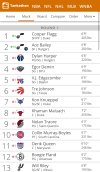I think it's been fairly optimistic, what has you down? It's still not a big spread between us, but scrappiness from Brooklyn/Portland/Detroit has been good.
I know they're either injured or broken, but I just struggle to see Philly or New Orleans being worse than us over a season. They'll get their **** together enough. Washington is an epic **** storm, perfectly crafted to tank and we shouldn't worry to much about passing them.
Toronto/Charlotte/Chicago are neck and neck with us, but have at least shown themselves to be more competitive than us so far.
The season is full of runs, but I'm feeling pretty good about our potential for bottom 3 seed. Collins/Collin trades would definitely help but not feeling too likely. Collier and Cody are our secret tank weapons, and hopefully they get unleashed for 25 MPG later in the season.
I think this is about as good as you could have hoped for while keeping Lauri. If we wanted to be like the Wizards we would have had to trade him and probably others as well.

